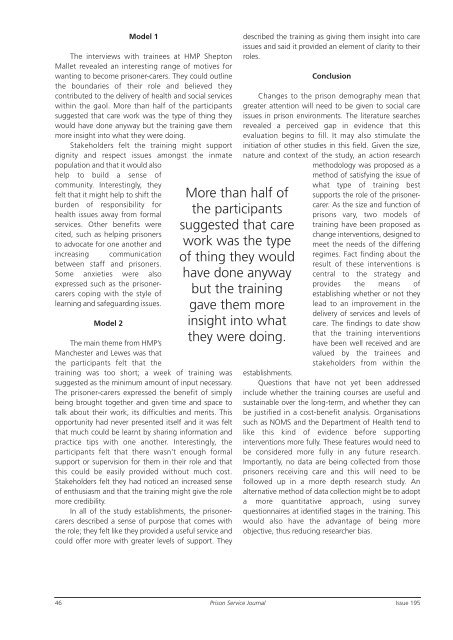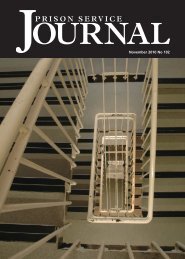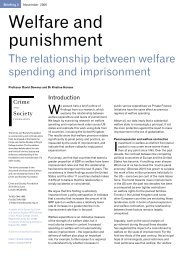Focus on Disability
Focus on Disability
Focus on Disability
You also want an ePaper? Increase the reach of your titles
YUMPU automatically turns print PDFs into web optimized ePapers that Google loves.
Model 1<br />
The interviews with trainees at HMP Shept<strong>on</strong><br />
Mallet revealed an interesting range of motives for<br />
wanting to become pris<strong>on</strong>er-carers. They could outline<br />
the boundaries of their role and believed they<br />
c<strong>on</strong>tributed to the delivery of health and social services<br />
within the gaol. More than half of the participants<br />
suggested that care work was the type of thing they<br />
would have d<strong>on</strong>e anyway but the training gave them<br />
more insight into what they were doing.<br />
Stakeholders felt the training might support<br />
dignity and respect issues am<strong>on</strong>gst the inmate<br />
populati<strong>on</strong> and that it would also<br />
help to build a sense of<br />
community. Interestingly, they<br />
felt that it might help to shift the<br />
burden of resp<strong>on</strong>sibility for<br />
health issues away from formal<br />
services. Other benefits were<br />
cited, such as helping pris<strong>on</strong>ers<br />
to advocate for <strong>on</strong>e another and<br />
increasing communicati<strong>on</strong><br />
between staff and pris<strong>on</strong>ers.<br />
Some anxieties were also<br />
expressed such as the pris<strong>on</strong>ercarers<br />
coping with the style of<br />
learning and safeguarding issues.<br />
Model 2<br />
The main theme from HMP’s<br />
Manchester and Lewes was that<br />
the participants felt that the<br />
training was too short; a week of training was<br />
suggested as the minimum amount of input necessary.<br />
The pris<strong>on</strong>er-carers expressed the benefit of simply<br />
being brought together and given time and space to<br />
talk about their work, its difficulties and merits. This<br />
opportunity had never presented itself and it was felt<br />
that much could be learnt by sharing informati<strong>on</strong> and<br />
practice tips with <strong>on</strong>e another. Interestingly, the<br />
participants felt that there wasn’t enough formal<br />
support or supervisi<strong>on</strong> for them in their role and that<br />
this could be easily provided without much cost.<br />
Stakeholders felt they had noticed an increased sense<br />
of enthusiasm and that the training might give the role<br />
more credibility.<br />
In all of the study establishments, the pris<strong>on</strong>ercarers<br />
described a sense of purpose that comes with<br />
the role; they felt like they provided a useful service and<br />
could offer more with greater levels of support. They<br />
More than half of<br />
the participants<br />
suggested that care<br />
work was the type<br />
of thing they would<br />
have d<strong>on</strong>e anyway<br />
but the training<br />
gave them more<br />
insight into what<br />
they were doing.<br />
described the training as giving them insight into care<br />
issues and said it provided an element of clarity to their<br />
roles.<br />
C<strong>on</strong>clusi<strong>on</strong><br />
Changes to the pris<strong>on</strong> demography mean that<br />
greater attenti<strong>on</strong> will need to be given to social care<br />
issues in pris<strong>on</strong> envir<strong>on</strong>ments. The literature searches<br />
revealed a perceived gap in evidence that this<br />
evaluati<strong>on</strong> begins to fill. It may also stimulate the<br />
initiati<strong>on</strong> of other studies in this field. Given the size,<br />
nature and c<strong>on</strong>text of the study, an acti<strong>on</strong> research<br />
methodology was proposed as a<br />
method of satisfying the issue of<br />
what type of training best<br />
supports the role of the pris<strong>on</strong>ercarer.<br />
As the size and functi<strong>on</strong> of<br />
pris<strong>on</strong>s vary, two models of<br />
training have been proposed as<br />
change interventi<strong>on</strong>s, designed to<br />
meet the needs of the differing<br />
regimes. Fact finding about the<br />
result of these interventi<strong>on</strong>s is<br />
central to the strategy and<br />
provides the means of<br />
establishing whether or not they<br />
lead to an improvement in the<br />
delivery of services and levels of<br />
care. The findings to date show<br />
that the training interventi<strong>on</strong>s<br />
have been well received and are<br />
valued by the trainees and<br />
stakeholders from within the<br />
establishments.<br />
Questi<strong>on</strong>s that have not yet been addressed<br />
include whether the training courses are useful and<br />
sustainable over the l<strong>on</strong>g-term, and whether they can<br />
be justified in a cost-benefit analysis. Organisati<strong>on</strong>s<br />
such as NOMS and the Department of Health tend to<br />
like this kind of evidence before supporting<br />
interventi<strong>on</strong>s more fully. These features would need to<br />
be c<strong>on</strong>sidered more fully in any future research.<br />
Importantly, no data are being collected from those<br />
pris<strong>on</strong>ers receiving care and this will need to be<br />
followed up in a more depth research study. An<br />
alternative method of data collecti<strong>on</strong> might be to adopt<br />
a more quantitative approach, using survey<br />
questi<strong>on</strong>naires at identified stages in the training. This<br />
would also have the advantage of being more<br />
objective, thus reducing researcher bias.<br />
46 Pris<strong>on</strong> Service Journal<br />
Issue 195











